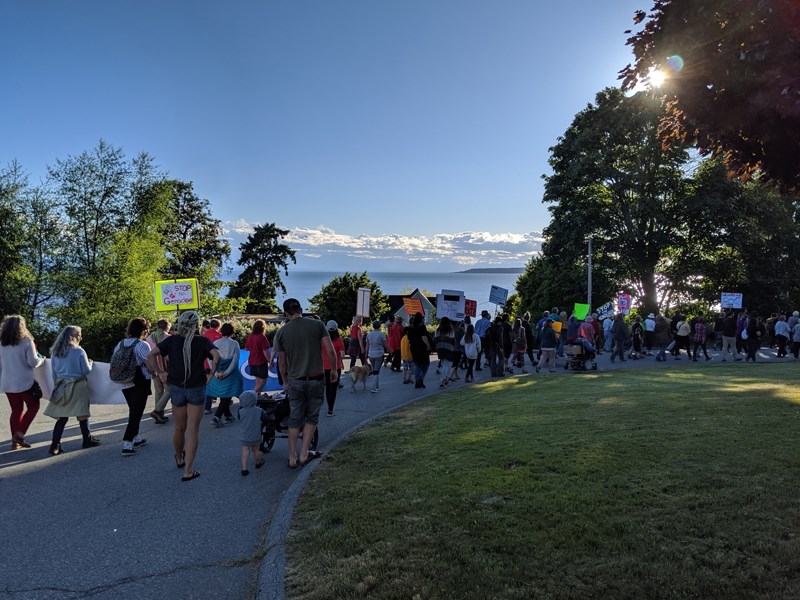An estimated 200 indigenous and non-indigenous local residents took part in a march commemorating missing and murdered indigenous women, girls and two-spirited people earlier this month sparking dialogue about colonization and reconciliation among participants.
The march followed the publication, this month, of the National Inquiry into Missing and Murdered Indigenous Women and Girls (MMIWG) report, which concluded that murdered and missing indigenous women, girls and two-spirited people were victims of a larger genocide in Canada.
Walking along Marine Avenue on June 7, participants in the Powell River march sang the “Women’s Warrior Song” and displayed signs calling for justice, fairness and respect.
Cyndi Pallen, a Stop the Violence program counsellor, was among those who coordinated the event.
“The more we talked about it in the community, the more we kept hearing more stories,” said Pallen. “We’ve done a lot of work, but this was one of the hardest ones to coordinate. We’re happy, though. We had our other nations travel here to come and be with us and witness it.”
The march was part of a two-day series of gatherings, which began with a healing ceremony at the Tla’amin Salish Centre honouring the families of missing and murdered indigenous women and girls. Organizers also invited Tla’amin Nation sister nations Homalco First Nation and Klahoose First Nation to the healing ceremony.
Following Pallen’s expert recommendations (she completed her thesis on the subject of trauma at University of Victoria), the event adhered to the traditional cultural values and teachings of the Tla’amin people.
“We knew that we had to first of all get people grounded in who they are; we brushed [the families] off with the cedar before they spoke so that they were blanketed,” explained Pallen. “We followed our protocols all the way through. After everyone spoke a song was sung for them while other people came to go see that person who stood with them, but everything was weaved in regularly so that we’re not always going to that dark place. It was very well planned.”
Pallen hailed the event’s success, but said she wants to see firm public commitments to the recommendations of the MMIWG report.
“Our hope is that the government would put in place more resources and support for indigenous women. We just want the word to be out there and for people to be recognized.”
Tla’amin citizen and march participant Koosen Pielle said she was impressed by the turnout at both events, and spoke to their significance in raising awareness about MMIWG.
“It was so incredible that the Powell River community was part of that awareness,” she said. “There’s little awareness of this issue in Canada. For us to show that we stand in solidarity and we understand this affects our community, it was pretty huge.”
Pielle said a lack of awareness among non-indigenous people comes from a deeper scarcity of information and education regarding the topic of colonization.
“The government has done a really good job of hiding a lot of information from the general public; this all stems back to colonization,” she added. “Talking about it and acknowledging that it even exists, that is the first step, and not a lot of people are there yet.”
However, Pielle said this month’s march initiated dialogue she hopes to see culminate in public action.
“The more we talk about it, the more we’re going to have to push our government to do something about it,” she added.
Powell River-Sunshine Coast MLA Nicholas Simons, who also attended the march, said the event served as an important reminder of the reconciliation work that still needs to be done.
“It was important for people to demonstrate their acknowledgement of the findings of the final report on missing and murdered women and girls,” said Simons. “Many families have been impacted by the loss of a family member, including families from the Sunshine Coast. Walking together reminds us that we are united in honour of the lives impacted and lost, but also in our commitment to work together to respond to the report's recommendations.”



